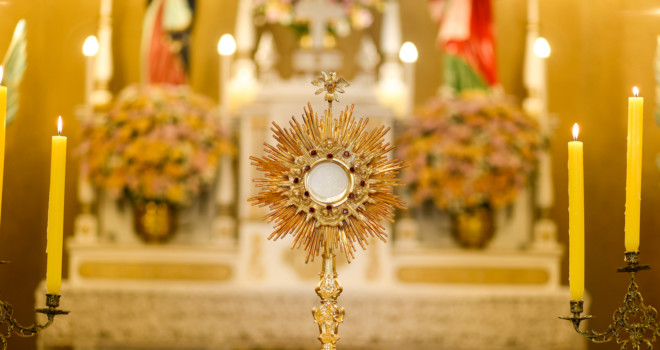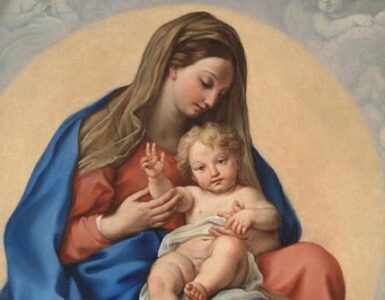Companion in Our Exile
In the Holy Eucharist, Christ is not only the food of our souls, but also the companion of our exile. The human heart yearns for the sweet consciousness of companionship. The Divine Presence in the tabernacle fully satisfies this natural longing, for God alone can fill the heart.
Christ fulfills His promise of continued companionship by laying hold of this universal law of His own implanting in our nature. In the Blessed Sacrament, through the unmistakable signs of our Lord’s nearness, we experience the most thorough enjoyment of His companionship.
To recognize His presence, we need not behold Him. His word, although He conceals Himself from us, proves His sacramental reality. The elements that veil Him to mortal eyes make Him accessible whenever we wish to converse with Him.
If we are prayerfully recollected in our audiences with our Lord and Master, He soothes our troubled souls into placidity by the atmosphere of His proximity to us. In Holy Communion, His loving embrace fills us with a joy that will, if we reciprocate His love, efface every other feeling by its superior ardor. But even in our moments before His eucharistic throne, in the stately silence of His gentle, gracious, genial presence, we are spiritually refreshed with His light and strength.
Preparation to Receive Him
Silent and loving before Him, we are
absolutely certain of His hidden reality; more certain than they who, in the
days of His flesh, beheld and touched His body, which curtained the
magnificence of the Godhead. With the eyes of faith, we see Him, not disfigured
and clouded by the weaknesses of human nature, but shining with heavenly light
in the grandeur of His beauty and in the perfection of His attributes.
To be so near our God, so rapt in love before Him, is to receive His most coveted blessings. As, when He walked the earth, He went about doing good, so, from the tabernacle, He dispenses love, joy, mercy, and peace. All that concerns us is to Him too deep, too precious for words. He cannot therefore send us away without some emanation of His humility, His obedience, His meekness, His self-denial. He best knows our needs, and will, if our faith is strong, supply them, or at least lighten the burden oppressing our hearts. And once within the circle of His divine attraction, we will leave Him either with our petitions answered, or with courage to suffer patiently.

In our visits, we can prepare ourselves to receive Him sacramentally. Poor, wretched, miserable, blind, and naked, we cannot alone make ourselves fit for the reception of our God. He must clothe our souls with the wedding garment of divine grace, and adorn them with virtue.
As we kneel before the eucharistic Savior, the Eternal Father will draw us closer to His Divine Son. Christ will so influence us as to bring out the best that is in us. The Holy Spirit will calm us with the peace of God, and thus remove the obstacles to our loving advance in intimate conversation with the sacramental King. Our very nearness to Christ will dispel our diffidence at the thought of too hasty an approach to the God who has found sin among the angels. Breathing the spiritual air of the tabernacle, illumining our souls with the light reflected from His earthly dwelling, strengthening our wills for conflict with temptation, deepening our faith in His almighty power, and purifying our desire to love Him more unselfishly — how can we better prepare ourselves to receive our God with a fervor that will ever inflame us with eager enthusiasm in His service?
Prayers of Healing & Reparation
The peace of soul that is ours in our
moments of adoration is a blissful exaltation above the turmoil of time, an
anticipation of the eternal peace of Heaven. Our union with the eucharistic
worshipers, the myriad hosts of angels that surround the tabernacle, adoring
in Heaven as they gaze forever on His soul-stirring divinity, humbly prostrate
before Him in His sacramental lowliness as He hides the beauty that would
overwhelm us — what is this but paradise on earth?
Thus raised above the visible, we can forego its claims and honor Christ for His own dear sake. We can compensate for the irreverences of those who believe, but do not realize, the mystery of His Real Presence, and for the profanations of those who absolutely deny it. If we love Christ, we will gladly spend ourselves trying to repair the dishonor which He so patiently endures in the sacrament of His love. The conscious recognition of what He suffers will help us to increase our love of Him.
Our reparation does not remove the injuries, nor do we absolve the offenders by offering our love as compensation for their want of love. But heart speaking to heart in understanding sympathy gives to the heart’s desires an additional value. Only too tragically verified, in our day, are the words of the evangelist: “He came unto His own, and His own received Him not.” In the anguish of His rejection by so many for whom He died, Christ turns to souls who love the tranquillity, the eternal calm, of His eucharistic humiliation. As they tell Him of their joy just to be near Him; as they beseech Him for greater grace to communicate more worthily; as they pour out their love for Him — love ever intensifying with the frequency of their Holy Communions — as they invite the angels around the tabernacle to join in their act of thanksgiving for this divinely gracious gift, their love and their gratitude will touch His Sacred Heart, and will make amends for the heartless unconcern, the chilling disregard, of His thoughtless creatures.
When the world is cold to Christ, and questions with superficial, destructive criticism the truth of His sacramental presence, while He continues to dwell with infinite patience in a desert of forgetfulness, where ingratitude so abounds, and to bless those who outrage Him, our loving reparation may be best appraised by the withering disappointment that the sacramental Savior daily experiences in those who seem to delight in driving Him, their God, far from them.
Love in the Sacrament
God is always lavish of His love. To enhance
our appreciation of His goodness, and therefore add to our happiness, He
adorns His gifts. The natural world demonstrates this truth. The gorgeous
beauty of the landscape; the golden glory of the rising and setting sun; the
colors, which only the Divine Artist could blend, of the rose, the lily, and
the violet; the human body with its admirable grace of movement; the
attractiveness of the human countenance; the inestimable pleasure of true,
loyal friendship — these, which are not necessary for existence, but which so
embellish and heighten the enjoyment of life, since they are its distinctive
charm, all testify to the magnanimity and tenderness of God’s love.
The same truth is applicable in the
institution of the Blessed Sacrament. Christ, in this prodigy of divine
ingenuity, besides being the food of the soul, and the pledge of eternal life,
is also our companion in all the hardships of earth. The joy of His loving,
silent, yet consciously felt, affectionate companionship — the harbinger of
our intimate, perfect, eternal union with Him — is a superadded blessing, as if
this were the only reason for this overflow of divine love.
O eucharistic God, deepen our supernatural consciousness of Thy infinite generosity. Consume in us all that is worldly. Purify wholly our interior and quicken our higher faculties, so that we may better appreciate this supreme expression of Thy love for us. Kindle in our hearts a love that will meet the advances of Thy love and associate us now and forever with Thy deepest source of life.
✠
This article is adapted from a chapter in Fr. Kane’s Transforming Your Life Through the Eucharist. It is available through your favorite bookstore or online at Sophia Institute Press.













